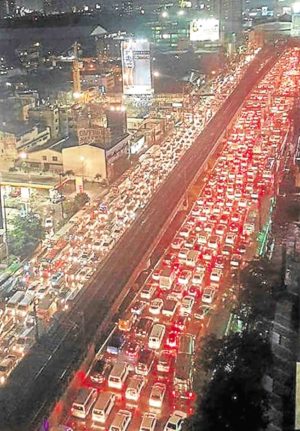Harried urban warriors embrace online shopping
Metro Manila’s highways and alleys vanish in a sea of crawling vehicles making their way to the numerous shopping centers that dot the landscape.
Indeed, it’s Christmas season in the capital and harried and stressed out drivers and commuters are out in full force to buy gifts for the lucky ones on their Christmas list.
But not Ygy Arcilla, a human resources executive and young mother. She has achieved the same shopping feat in her eveningwear at home, tapping away at her mobile phone.
Arcilla joins a growing number of urban warriors who have embraced online shopping as a way of beating the horrendous traffic in Metro Manila, where stories of multihour commutes or drives are not unusual.
“We try to avoid malls as much as we can. We only go there if it’s absolutely necessary,” she told the Inquirer, noting that the comfort away from congested roads far outweighed the risk of online fraud. “Time is gold.”
Arcilla’s buying habits are helping fuel the Philippines’ fast-growing e-commerce sector, where revenues are expected to hit $1.2 billion in 2017 and breach $2.6 billion by 2022, according to research firm Statista Inc.
Online retailers have adjusted to the domestic market, where millions still do not have a bank account or own a credit card.
All manner of payments are accepted: credit and debit cards, cash on delivery and even mobile wallet services. Goods are typically delivered within a few days.
This bevy of options lures consumers like Arcilla, who started to seriously shop online in 2015, when she bought baby supplies and clothes for her newborn son. She hasn’t looked back since.
“Trust your instincts. Best thing to do is read the seller reviews. Luckily for me, I haven’t had any bad experience with my items,” Arcilla said on how to avoid online scammers.
Traffic is a perennial and growing issue in urban areas such as Metro Manila, home to about 12 million people, or over 10 percent of the country’s total population.
Transportation regulators have been battling the problem but with little success. Relief could come by 2020 and far beyond, when new expressways and railway projects are opened.
This situation makes the Philippines fertile ground for e-commerce, as consumers transition from older buying habits into more convenient options, enabled by increasing wealth, rising smartphone sales and deeper internet penetration.
The potential for growth is large, with e-commerce penetration in the Philippines estimated at 39 percent by United Kingdom-based consult We Are Social, based on a survey early this year.
The country’s largest business groups, with an eye toward the future, are jumping in.
PayMaya, a nonbanking financial service app backed by telco giant PLDT Inc., saw a six-fold increase in the payments it processed for online merchants in November.
As Christmas shopping peaks this weekend, growth is expected to accelerate, said Paolo Azzola, PayMaya chief operating offer and managing director.
“E-commerce has made Filipinos more efficient. Online shopping is all about saving a lot of time and energy for consumers to allow them to be more productive and attend to more urgent matters,” Azzola said.
PLDT’s rival, Globe Telecom, owned by Ayala Corp., saw the entry of Chinese tycoon Jack Ma’s Ant Financial into its fintech unit in August.
Mall developers, which still define the retail experience for most Filipinos, are seeing both potential competition and a new area of opportunity in e-commerce.
Henry Sy’s SM Prime Holdings, which owns the country’s biggest shopping mall franchise, last year partnered with online department store Lazada while Gokongwei-led Robinsons Retail Holdings Inc. is taking more online orders for its supermarkets via delivery service Honestbee.
Earlier this month, Robinsons Retail bought a 20-percent stake in the operator of online wellness shop BeautyMNL.
The Ayala group, whose property unit developed the Makati financial district in Metro Manila, also acquired in September a 49-percent stake in online apparel retailer Zalora Philippines.
“The worsening traffic situation is one of the drivers [of e-commerce],” Zalora Philippines cofounder and chief executive officer Paulo Campos III said in an interview.
But he noted that changing shopping habits had spread beyond urban areas. Zalora has been increasing its footprint in parts of Visayas and Mindanao, where buyers lack access to the wide selection of goods found in larger cities.
“We are really seeing the growth being the fastest in those places, more so than in Metro Manila,” Campos said.
Should malls be worried about becoming obsolete? For online shopping aficionado Arcilla, that would take some more time.
“It’s tried and tested. If your house is walking distance from a nearby mall, then good for you. You get exercise, and the feel of ‘true shopping’—plus spending time with family and friends while doing it is a bonus,” she said.















